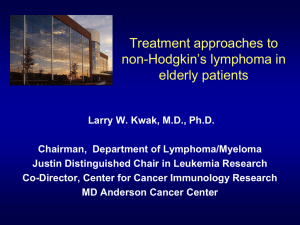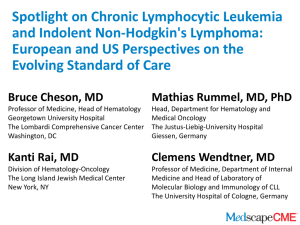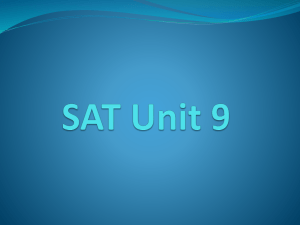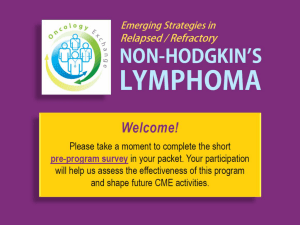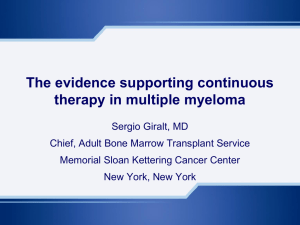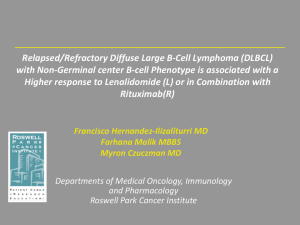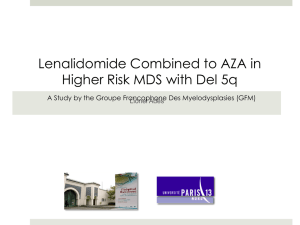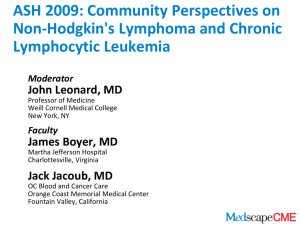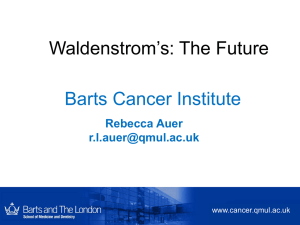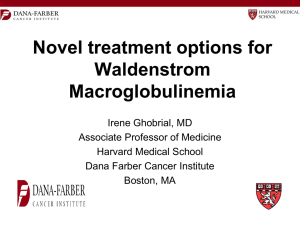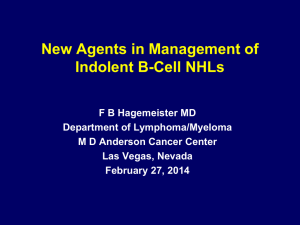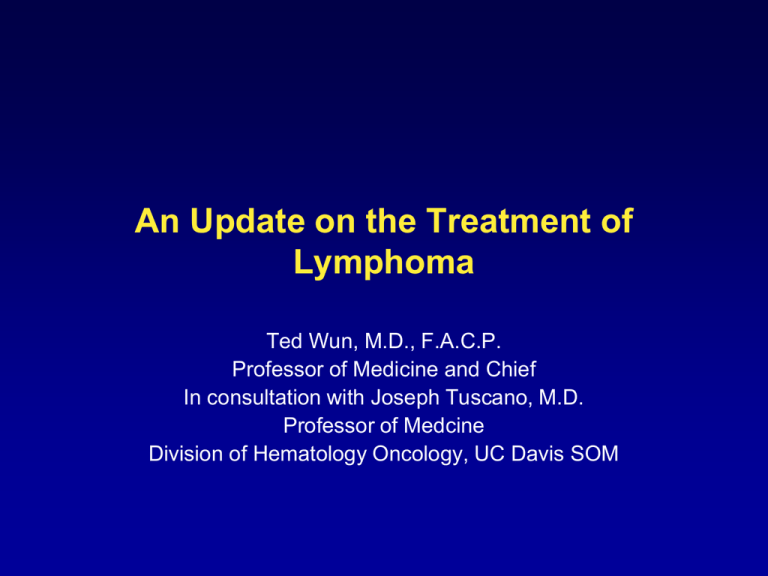
An Update on the Treatment of
Lymphoma
Ted Wun, M.D., F.A.C.P.
Professor of Medicine and Chief
In consultation with Joseph Tuscano, M.D.
Professor of Medcine
Division of Hematology Oncology, UC Davis SOM
Objectives
• To have a better understanding of the role of maintenance
Rituximab after initial induction therapy for indolent lymphoma
• Elucidate the role of dose dense chemotherapy in the
management of diffuse large cell lymphoma
• Examine the role of Lenalidomide in the management of
lymphoma
• Have a better understanding of the up-front management
strategies for indolent lymphoma-answer the question “is there
a new standard of care?”
The Role of Rituxan for Induction and
Maintenance of Indolent Lymphoma
Unresolved questions
• How does Rituximab maintenance compare with
retreatment at progression?
• Will newer, more effective induction regimens
eliminate the need for Rituximab maintenance?
• What are the best endpoints for Rituximab
maintenance trials?
– ORR, PFS, OS, QOL ?
What is the Role of Rituxan for Purging
Prior to Auto PSCT and Maintenance
After
EBMT-Lym-1
Conclusions
• Rituximab maintenance significantly prolongs
PFS post AutoPSCT for relapsed indolent NHL
• Rituximab purging does not have a significant
effect on PFS
•Consistent with prior studies, AutoPSCT produces
durable remissions in patients with relapsed
indolent NHL and may be curative in some patients
Maintenance rituximab for FL
Richard Fischer ASCO 2010
The role of Lenalidomide for the
treatment of lymphoma
Francisco Hernandez-Ilizaliturri, MD,1 George Deeb, MD,2 Pier
Luigi Zinzani, MD,3 Stefano A. Pileri, MD,3 Farhana Malik, MD,4
William R. Macon, MD,5 Andre Goy, MD,6 Thomas E Witzig,
MD,5 and Myron S. Czuczman, MD1
American Society of Clinical Oncology
June 2010
1. Medical Oncology and Immunology, Roswell Park Cancer Institute, Buffalo, NY; 2. Pathology, Roswell Park Cancer Institute,
Buffalo, NY; 3. Department of Haematology and Oncological Sciences Lorenzo and Ariosto Seràgnoli (DHOS-S), University of
Bologna, Bologna, Italy; 4. Medical Oncology, Roswell Park Cancer Institute, Buffalo, NY; 5. College of Medicine, Mayo Clinic,
Rochester, MN; 6. The John Theurer Cancer Center at the Hackensack University Medical Center, Hackensack, NJ.
Back to TOC
Relapsed/Refractory Diffuse Large B-Cell
Lymphoma With Nongerminal Center B-Cell
Phenotype Is Associated With a Higher
Response to Lenalidomide Monotherapy or in
Combination With Rituximab
Lenalidomide Response in Rel/Ref DLBCL: NFκB
Target Genes Are Highly Expressed in Activated BCell–Like DLBCL
NFκB Target Gene
IRF-4
Cyclin D2
Pim-1
Lyn
BIC
CD44
FLICE
IM684838
IκB
EBI2
NCF2
DIFF48
CCR7
SNF2L2
NFκB1
IL-6
P Value
6.23 E-29
1.28 E-16
2.69 E-19
5.34 E-19
6.49 E-18
2.35 E-13
3.30 E-14
8.74 E-14
7.64 E-09
2.77 E-07
6.67 E-07
2.86 E-06
1.55 E-05
1.16 E-05
6.68 E-05
4.01 E-04
Rel/Ref=relapsed/refractory; DLBCL=diffuse large B-cell lymphoma; NFKB=nuclear factor kappa B; ABC=activated Bcell–like; GCB=germinal center B-cell–like.
Courtesy of L. Staudt.
Hernandez-Illizaliturri et al. Abstract and poster presented at: 2010 Annual ASCO Meeting; June 4-8, 2010; Chicago, IL.
Abstract 8038.
Lenalidomide Response in Rel/Ref DLBCL: The
Stromal-2 Signature Encodes Regulators and
Components of Angiogenesis (unfavorable)
Courtesy of L. Staudt.
Hernandez-Illizaliturri et al. Abstract and poster presented at: 2010 Annual ASCO Meeting; June 4-8, 2010; Chicago, IL.
Abstract 8038.
Lenalidomide Response in Rel/Ref DLBCL: Can
We Predict Clinical Response to Lenalidomide
in DLBCL Patients?
• Retrospective study of patients with DLBCL treated with lenalidomide
alone or in combination with rituximab or dexamethasone at 4
academic institutions (N=56)
–
–
–
–
RPCI (N=19)
Mayo Clinic (N=20)
University of Bologna (N=11)
John Theurer Cancer Center at the Hackensack University (N=6)
• Patients divided into GCB and non-GCB cohorts using the criteria
proposed by Hans et al
• Tumor biopsies are routinely stained for MUM1, CD10, Bcl-6, and
Ki67 by the Pathology Department at RPCI or the Mayo Clinic
• Responses to lenalidomide assessed by standard and/or revised
Cheson criteria1,2
• Differences in RR, response duration to lenalidomide and OS were
analyzed using the software program SPSS 14
RPCI=Roswell Park Cancer Institute; RR=response rate; OS=overall survival.
Hernandez-Illizaliturri et al. Abstract and poster presented at: 2010 Annual ASCO Meeting; June 4-8, 2010; Chicago, IL.
Abstract 8038.
1. Cheson et al. J Clin Oncol. 2007 Feb 10;25(5):579-86; 2. Cheson et al. J Clin Oncol. 1999;17:1244-1253.
Lenalidomide Response in Rel/Ref DLBCL: Can We
Predict Clinical Response to Lenalidomide in DLBCL
Patients?
• Rel/Ref DLBCL: N=56
• Histological diagnosis
– DLBCL=49
– FL and DLBCL (composite)=5
– Transformed NHL=2
• IHC classification of the patients
– Non-GCB=28
– GCB=25
– Undetermined=3
• Median age=66 years (range 43-80)
• Median number of prior therapies=4 (range 2-13)
• Median cycles of lenalidomide=2 (range 1-35)
FL=follicular lymphoma; IHC=immunohistochemistry.
Hernandez-Illizaliturri et al. Abstract and poster presented at: 2010 Annual ASCO Meeting; June 4-8, 2010; Chicago, IL.
Abstract 8038.
Lenalidomide Response in Rel/Ref DLBCL: Differences
in Responses to Lenalidomide Monotherapy in Rel/Ref
GCB vs Non-GCB DLBCL (N=40)
• The ORR rate for patients with GCB DLBCL was 8.7% vs 53% for patients with
non-GCB DLBCL treated with lenalidomide monotherapy
• No differences in the median number of treatments, IPI score, histology, stage,
or other demographic characteristics were seen at time of lenalidomide Rx
between the 2 groups
PR=partial response; CR=complete response; ORR=overall response rate.
Hernandez-Illizaliturri et al. Abstract and poster presented at: 2010 Annual ASCO Meeting; June 4-8, 2010; Chicago, IL.
Abstract 8038.
Lenalidomide Response in Rel/Ref DLBCL: PFS
Following Lenalidomide Monotherapy in DLBCL
According to Histological Subtype
Median
DLBCL
Subtype Estimate
SE
95%
Confidence
Interval
Lower Upper
Bound Bound
N=40
Non-GCB
187
51.4
86.16
287.84
GCB
51
22.1
7.57
94.43
Hernandez-Illizaliturri et al. Abstract and poster presented at: 2010 Annual ASCO Meeting; June 4-8, 2010; Chicago, IL.
Abstract 8038.
Lenalidomide Response in Rel/Ref
DLBCL: CC-5013-DLC-001 Study Schema
Hernandez-Illizaliturri et al. Abstract and poster presented at: 2010 Annual ASCO Meeting; June 4-8, 2010; Chicago, IL.
Abstract 8038.
Lenalidomide Response in Rel/Ref
DLBCL: Summary
• Lenalidomide monotherapy or in combination with rituximab are active
salvage therapies in rel/ref DLBCL
• These data strongly suggest that 2 previously identified groups of
patients with DLBCL (GCB vs non-GCB) appear to have significantly
different degrees of responsiveness to lenalidomide in the rel/ref setting
• A prospective phase 2/3 randomized clinical trial comparing
lenalidomide vs investigator choice of “salvage monotherapy” in patients
with rel/ref DLBCL is underway; patients will be stratified according to
the Hans algorithm as GCB or non-GCB DLBCL prior to treatment
Hernandez-Illizaliturri et al. Abstract and poster presented at: 2010 Annual ASCO Meeting; June 4-8, 2010; Chicago, IL.
Abstract 8038.
R2: Preliminary Results of a Phase 2
Study of Lenalidomide and Rituximab
in Relapsed/Refractory Indolent NHL
Mrinal Dutia,1 Ian DeRoock,2 Karen Chee,3 Robert
O’Donnell,2 Christine Quirch,2
Christine Reed-Pease,2 Joseph M. Tuscano2
1UC
Davis Cancer Center, Sacramento, CA,
2UC Davis Medical Center, Sacramento, CA,
3California Cancer Care, San Mateo, CA
American Society of Hematology
December 2009
Back to TOC
Lenalidomide and Rituximab in Rel/Ref
Indolent NHL: Introduction and Objective
• Introduction
– Lenalidomide is a potent immunomodulatory agent
with both antiproliferative and antiangiogenic activity
– Lenalidomide monotherapy has clinical activity in patients with
rel/ref indolent and aggressive lymphomas
– Synergistic activity between lenalidomide and
rituximab has been reported in both cellular and animal
lymphoma models
• Objective
– To evaluate the safety and efficacy of the combination of R2 in a
phase 2, single-arm study of patients with rel/ref indolent NHL
Rel/ref=relapsed/refractory.
Dutia et al. Abstract and poster presented at: 51st Annual ASH Meeting and Exhibition; December 5-8, 2009.
Abstract 1679.
Back to TOC
Lenalidomide and Rituximab in Rel/Ref
Indolent NHL: Baseline Characteristics (N=16)
Baseline Patient Characteristics
Median age, years (range)
60 (50-91)
Men/women, n (%)
8/8 (50/50)
Histology, n (%)
FL
13 (81)
MZL
2 (13)
SLL
1 (6)
Median time from dx to treatment, years (range)
7.3 (1.2-19)
Median lines of prior therapy (range)
3 (1-11)
Prior rituximab, n (%)
Refractory to prior rituximab, n (%)*
14 (88)
7 (44)
MZL=marginal zone lymphoma; dx=diagnosis.
* Rituximab resistance was defined as no response, or relapse ≤6 months after initiating rituximab.
Dutia et al. Abstract and poster presented at: 51st Annual ASH Meeting and Exhibition; December 5-8, 2009.
Abstract 1679.
Back to TOC
Lenalidomide and Rituximab in Rel/Ref
Indolent NHL: Grade 3/4 AEs (N=16)
Grade 3/4 AEs (occurring in 10% of patients )
n (%)
Lymphopenia
4 (25)
Neutropenia
3 (18)
Fatigue
2 (12)
Hyponatremia
3 (18)
After prophylaxis was initiated,
TLS was not observed at the 20-mg dose level
AE=adverse event.
Dutia et al. Abstract and poster presented at: 51st Annual ASH Meeting and Exhibition; December 5-8, 2009.
Abstract 1679.
Back to TOC
Lenalidomide and Rituximab in Rel/Ref Indolent NHL:
Response Based on Histology and Prior Therapy
n
ORR, % CR/CRu, n
PR, n
SD, n
PD, n
Indolent NHL
16
75
5
7
2
2
FL
13
85
5
6
1
1
MZL
2
50
0
1
0
1
SLL
1
0
0
0
1
0
Responses based on prior therapy
Rituximab-refractory
7
57
1
3
1
2
Heavily pretreated*
10
70
3
4
1
2
* Heavily pretreated, 3 prior therapies; CRu=unconfirmed complete response; PD=progressive disease.
Dutia et al. Abstract and poster presented at: 51st Annual ASH Meeting and Exhibition; December 5-8, 2009.
Abstract 1679.
Back to TOC
Lenalidomide and Rituximab in Rel/Ref
Indolent NHL: Summary and Conclusions
• 75% ORR (31% CR) in all patients with indolent NHL
• Particular activity noted among patients with rel/ref FL
– 85% ORR in (11 of 13) patients with FL
– 38% CR/CRu
• Responses appeared to correlate with number of cycles of
lenalidomide received
– 5 patients with a CR/CRu received a median of 13 cycles
– 7 patients with a PR received a median of only 7 cycles
• TLS prophylaxis and monitoring are recommended, particularly
during the initial cycles of treatment
• Further evaluation of this combination is underway
– In larger studies of indolent NHL, and particularly in patients with FL
– In earlier lines of therapy
Dutia et al. Abstract and poster presented at: 51st Annual ASH Meeting and Exhibition; December 5-8, 2009.
Abstract 1679.
A Biologic Combination of
Lenalidomide
and Rituximab for Frontline Therapy of
Indolent B-Cell Non-Hodgkin’s
Lymphoma
Nathan Fowler, Peter McLaughlin, Fredrick Hagemeister,
Larry W. Kwak, Michelle Fanale, Sattva Neelapu, Louis Fayad,
Barbara Pro, Crystal Sergent, Shana White, Felipe Samaniego
Department of Lymphoma/Melanoma,
MD Anderson Cancer Center, Houston, Texas
American Society of Hematology
December 2009
Phase II Study of Lenalidomide +
Rituximab in Indolent NHL: Rationale and
Objective
• Despite advances, optimal treatment for patients with newlydiagnosed indolent NHL has not been determined
• In the rel/ref setting, treatment with lenalidomide has resulted in a
response duration 16.5 months
• Rituximab has been shown to have clinical activity
in indolent NHL
• This phase II study evaluates the efficacy and safety of the
lenalidomide and rituximab as frontline treatment of indolent NHL
– Patients with untreated stage III or IV indolent NHL
– Rituximab 375 mg/m2 IV on Day 1 and lenalidomide 20 mg/day on Days
1-21 of a 28-day cycle
– A total of 6 cycles administered
Rel/ref=relapsed/refractory; IV=intravenous.
Fowler et al. Abstract and poster presented at: 51st Annual ASH Meeting and Exhibition; December 5-8, 2009;
New Orleans, LA. Abstract 1714.
Phase II Study of Lenalidomide + Rituximab in
Indolent NHL: Patient Demographics (N=30)
Characteristic
Median Age (range), years
Sex, n (%)
Histology, n (%)
FLIPI score, n (%)
(n=18)
BM involvement, n (%)
Women
Men
MZL
SLL
FL
Low
Intermediate
High
Positive
Negative
56 (3377)
13 (43)
17 (57)
9 (30)
3 (10)
18 (60)
3 (17)
12 (66)
3 (17)
7 (23)
23 (77)
FLIPI=Follicular Lymphoma International Prognostic Index; BM=bone marrow; MZL=marginal zone lymphoma.
Fowler et al. Abstract and poster presented at: 51st Annual ASH Meeting and Exhibition; December 5-8, 2009;
New Orleans, LA. Abstract 1714.
Phase II Study of Lenalidomide + Rituximab in Indolent
NHL: Most Common Grade 3 or 4 AEs Were Rash,
Neutropenia, and Myalgia (N=30)
AEs
Grade 3
n (%)
Grade 4
n (%)
Rash
6 (20)
0
Neutropenia
4 (13)
3 (10)
Myalgia
4 (13)
0
Infection
1 (3)
0
Neuropathy
1 (3)
0
Fatigue
1 (3)
0
0
1 (3)
Thrombosis
AEs=adverse events.
Fowler et al. Abstract and poster presented at: 51st Annual ASH Meeting and Exhibition; December 5-8, 2009;
New Orleans, LA. Abstract 1714.
Back to TOC
Phase II Study of Lenalidomide + Rituximab in Indolent
NHL: Therapy Was Generally Well Tolerated (N=30)
• 50% of patients developed rashes (all grades)
– Rash was self-limited
– Usually did not occur on re-exposure to drug
– 1 patient discontinued during cycle 1 due to leukocytoclastic
vasculitis
•
•
•
•
4 patients required dose reductions due to neutropenia
No patients developed TLS
1 patient experienced neuropathy (Grade 2)
Most common AEs were myalgia and fatigue (Grade 1/2)
TLS=tumor lysis syndrome.
Fowler et al. Abstract and poster presented at: 51st Annual ASH Meeting and Exhibition; December 5-8, 2009;
New Orleans, LA. Abstract 1714.
Back to TOC
Frontline Therapy With Lenalidomide +
Rituximab is Clinically Active in Patients With
Indolent NHL
Tumor subtype
n
SD
PR
CR/CRu
ORR (CR/CRu)
FL
17
1
0
16
94% (94%)
SLL
3
0
2
1
100% (33%)
MZL
8
3
1
4
63% (50%)
Total
28
4
3
21
86% (75%)
• 28 patients received at least 1 post-baseline tumor assessment
and were evaluable for response
CRu=unconfirmed complete response.
Fowler et al. Abstract and poster presented at: 51st Annual ASH Meeting and Exhibition; December 5-8, 2009;
New Orleans, LA. Abstract 1714.
Lenalidomide Plus Rituximab Is Clinically
Active as Frontline Therapy in Indolent
NHL
• 86% ORR (75% CR/CRu) in patients with indolent B-cell NHL
treated with lenalidomide + rituximab
– 94% ORR (94% CR/CRu) in patients with follicular lymphoma
– Treatment was well tolerated with a manageable toxicity profile
• Tolerability profile comparable to that observed with studies of
lenalidomide monotherapy
• The lenalidomide and rituximab combination appears to be
clinically relevant for first-line therapy of indolent B-cell NHL
• Additional studies are underway to explore the role for
lenalidomide + rituximab in the treatment of indolent NHL1,2
1. Ahmadi et al. Abstract and poster presented at: 51st Annual ASH Meeting and Exhibition; December 5-8, 2009; New Orleans,
LA. Abstract 1700; 2. Dutia et al. Abstract and poster presented at: 51st Annual ASH Meeting and Exhibition; December 5-8,
2009. Abstract 1679.
Fowler et al. Abstract and poster presented at: 51st Annual ASH Meeting and Exhibition; December 5-8, 2009; New Orleans, LA.
Abstract 1714.
Does dose dense CHOP-R improve
outcomes in patients with DLCL
R-CHOP14 VS R-CHOP21 in Elderly
DLBCL Patients: LNH03-6B GELA Trial
• In 2000, GELA trial showed superiority of R-CHOP21 over
CHOP21 in elderly patients with DLBCL[1]
• Other trials in elderly patients with DLBCL show superiority for
– CHOP14 vs CHOP21
– R-CHOP14 vs CHOP14
– LNH03 designed to compare R-CHOP14 vs R-CHOP21 in this
setting[2]
1. Coffier B, et al. N Engl J Med. 2002;346:235-242. 2. Delarue R, et al. ASH 2009. Abstract 406.
LNH03-6B GELA Trial: Study Design
DLBCL patients
60-80 yrs of age
(N = 202)
R-CHOP every 14 days
for 8 cycles +
IT MTX for 4 cycles
(n = 103)
R-CHOP every 21 days
for 8 cycles +
IT MTX for 4 cycles
(n = 99)
Prophylactic
Darbepoetin alfa
Conventional treatment
for chemotherapyinduced anemia
Prophylactic
Darbepoetin alfa
Conventional treatment
for chemotherapyinduced anemia
• Primary endpoint: EFS
• Secondary endpoints: CR or CRu , ORR, PFS , DFS, OS, dose
intensity, toxicity
Delarue R, et al. ASH 2009. Abstract 406.
LNH03-6B GELA Trial: Pt Characteristics
Characteristic
R-CHOP21
(n = 99)
R-CHOP14
(n = 103)
Median age, yrs
72
71
Elevated LDH, %
68
68
Mass > 10 cm, %
17
18
B symptoms, %
43
37
Ann Arbor 111-IV, %
85
92
IPI > 3, %
36
42
Age-adjusted IPI 2-3, %
59
67
Status
Delarue R, et al. ASH 2009. Abstract 406.
LNH03-6B GELA Trial: Results
Outcome
2-yr EFS, %
Median EFS, mos
2-yr PFS, %
Median PFS, mos
2-yr DFS, %
Median 2-yr OS, %
End-of-treatment response rates
CR + CRu
PR
ORR
Delarue R, et al. ASH 2009. Abstract 406.
R-CHOP21
(n = 99)
61
Not reached
63
Not reached
70
70
R-CHOP14
(n = 103)
48
22
49
23
57
67
P Value
75
9
84
67
14
81
NS
NS
NS
.11
-.12
-.40
.37
LNH03-6B GELA Trial: Toxicities
Patients (%)
• Hematologic toxicities greater for R-CHOP14
100
90
80
70
60
50
40
30
20
10
0
R-CHOP14
R-CHOP21
83
83
73
69
50
36
26 22
21 22
Grade 3/4
Grade 3/4
Grade 3/4
RBC
Grade 3/4
Leukocytes Neutrophiles Hemoglobin Transfusion Platelets
15 11
Platelet
Transfusion
• Patients on R-CHOP14 had higher rates of febrile neutropenia,
hospitalization, and death due to toxicity
Delarue R, et al. ASH 2009. Abstract 406.
LNH03-6B GELA Trial: Other Outcomes
• Patients randomized to receive every-21-day dosing more
likely to receive scheduled dose intensity
– Median cyclophosphamide dose intensity 96% with
R-CHOP21 vs 84% with R-CHOP14
– Median doxorubicin dose intensity 95% with R-CHOP21 vs 83%
with R-CHOP14
• 90% of patients in R-CHOP14 group administered filgrastim or
pegfilgrastim vs 68% for R-CHOP21
Delarue R, et al. ASH 2009. Abstract 406.
The role of Bendamustine in the initial
management of patients with indolent
lymphoma
STiL: First-line Bendamustine +
Rituximab in Patients With FL, Indolent,
and MCL
Stage III or IV CD20+
lymphoma
(N = 549)
Bendamustine-Rituximab
Bendamustine 90 mg/m2 on Days 1, 2
+ Rituximab 375 mg/m2 on Day 1
max 6 cycles, q 4 wks
(n = 260)
R-CHOP
Max 6 cycles, q 3 wks
(n = 253)
• Primary endpoint: noninferiority of bendamustine-rituximab when compared
with R-CHOP for first-line treatment of advanced lymphomas
• Secondary endpoints: response rates, time to next treatment, EFS, OS,
adverse events, infectious complications
Rummel MJ, et al. ASH 2009. Abstract 405.
STiL: Results
• Primary endpoint: bendamustine-rituximab superior to RCHOP for PFS in overall population
– PFS: 54.9 vs 34.8 mos (P = .00012)
• In subanalysis, bendamustine-rituximab superior to R-CHOP in
FL (P = .0281), mantle cell lymphoma (P = .0146), and
Waldenström’s macroglobulinemia (P = .0024)
• Secondary endpoints: bendamustine-rituximab at least
comparable to R-CHOP in all measurements
– bendamustine-rituximab better to R-CHOP for CR (39.6% vs
30.0%, respectively: P = 0.26) and time to next treatment (not
reached vs 37.5 mos, respectively; P = .001)
Rummel MJ, et al. ASH 2009. Abstract 405.
STiL: Toxicities
• Myelosuppression grade 3/4;
B-R vs R-CHOP (% of cycles),
respectively; P < .0001
140
Patients (n)
120
96
100
73
80
60
47 42
40
20
– Neutropenia: 10.7% vs 46.5%
– Leukocytopenia: 12.1% vs 38.2%
– G-CSF administered: 4.0% vs
20.0%
127
B-R (n = 260)
R-CHOP (n = 253)
18
16
• Other adverse events for BR
40
23
15
0
Rummel MJ, et al. ASH 2009. Abstract 405.
1
8
– Less alopecia (P < .001)
– Paresthesias (P < .001)
– Infectious complications
(P = .0025)
Conclusions
• Rituxan maintenance is appropriate for selected patients after
R-containing induction chemotherapy. However the optimal
maintenance remains undefined
• Lenalidomide with or without Rituximab is highly active in
patients with both indolent and DLCL-consider enrolling
patients of UCD clinical trials #197 (relapsed/refractory) and
#224 (initial therapy)
• CHOP-R 21 (for 8 cycles) remains the standard of care for the
initial management of DLCL-consider enrolling patients on
CALBG 50303 (DA-EPOCH-R vs CHOP-R)
• BR can be considered a new standard induction regimen of the
initial management of indolent NHL

